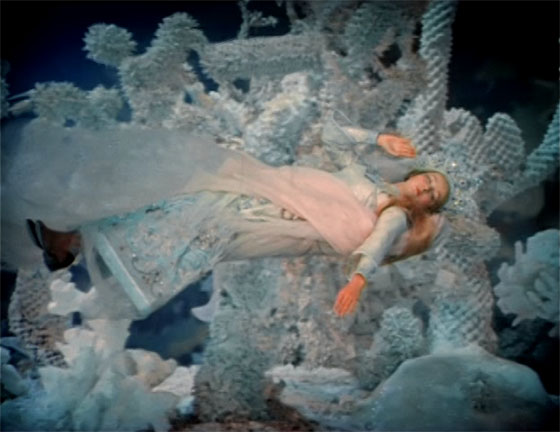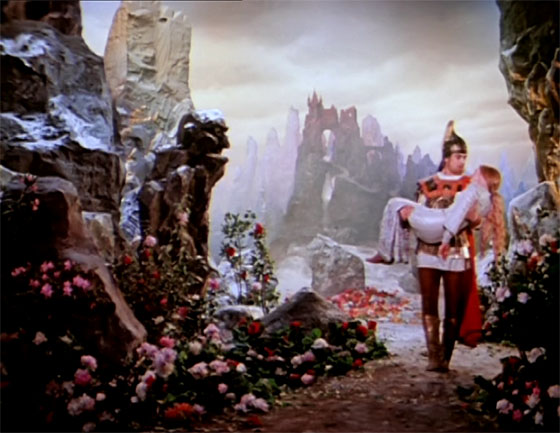
Ruslan and Ludmila (1972) was the last bow for Russian director and animator Aleksandr Ptushko, who would die shortly after the film’s release, aged 72. Ptushko began his career as a pioneer of stop-motion animation, directing one of the earliest examples of a feature-length animated film, the Communist parable The New Gulliver (1933); and over the ensuing decades developed an oeuvre of spectacles emphasizing fairy tale, Russian history, and romance, along with innovative special effects, including: The Golden Key (1939), The Stone Flower (1946), Sadko (1953), Ilya Muromets (1956), Sampo (1959), A Tale of Lost Times (1964), and The Tale of Tsar Saltan (1967). (Ptushko also supervised the special effects of the noted 1967 horror/fable Viy.) At 149 minutes, Ruslan and Ludmila belongs in a small subgenre one might call “fairy tale epic,” finding company with Douglas Fairbanks’ Thief of Bagdad (1924). It’s nearly as good, too. A crowning achievement for Ptushko’s career, the two-part film epitomizes his interest in romantic optimism, a literal treatment of fairy-tale fantasy, and deep-rooted Russian pride. Watching the film in its original Russian, it’s easy to forget the badly-dubbed and clumsily-edited Roger Corman cuts of some of Ptushko’s fantasies (The Day the Earth Froze, The Sword and the Dragon) that died a delirious death on MST3K. Ruslan and Ludmila, adapted from a poem by Alexander Pushkin, is simply bewitching. There are so many moments where the viewer will be trying to guess how an effect was achieved – shot after shot after shot, in rapid succession – that the only rational response is surrender to the film’s dream-like pull.
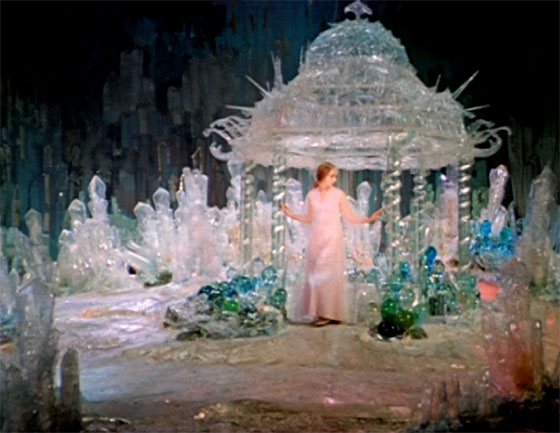
In the Hall of the Mountain King: Ludmila (Natalya Petrova) awakens in the realm of the sorceror Chernomor.
Set during the time of the Kievan State, Ruslan (Valery Kozinets) is a warrior from Kiev who has subdued the raiding Pechenegs and is returning home to marry Ludmila (Natalya Petrova), the fetching daughter of Prince Vladimir (Andrei Abrikosov). That Vladimir is permitting the princess to marry the man she has chosen enrages her other would-be suitors, Ratmir the heir of Khazan (Ruslan Akhmetov), the scheming Rogdai (Oleg Mokshantsev), and the Falstaffian Farlaf (Vyacheslav Nevinny). On their wedding night, evil magic intervenes: Ludmila is stolen right out of Ruslan’s arms (literally) and sucked out through the window. Prince Vladimir reprimands Ruslan for being unable to protect his new bride, and promises half his kingdom to whomever can bring his daughter back. Ratmir, Rogdai, and Farlaf volunteer for the quest. Meanwhile, Ludmila awakens in crystal chambers deep within the mountain kingdom ruled by Chernomor (Vladimir Fyodorov), a dwarf with a beard so long that it’s borne ahead of him by his many attendants. She proves to be a difficult conquest, throwing pillows at his terrified soldiers, discovering a turban which makes her invisible, and leading them on a wild chase throughout his realm. Ruslan befriends a Finnish wizard (Igor Yasulovich) and learns about the woman he once loved, the wicked sorceress Naina (Maria Kapnist-Serko), who is now in league with Chernomor. Naina sets traps for Ruslan, but he persists in his quest, wrestling a tiger, receiving guidance from the severed head of a giant, and finally soaring through the sky with Chernomor before cutting free his powerful beard. But even when Ludmila is rescued, further complications ensue: she is trapped in a sleeping spell, and Naina plots with Farlaf to murder Ruslan in his sleep.
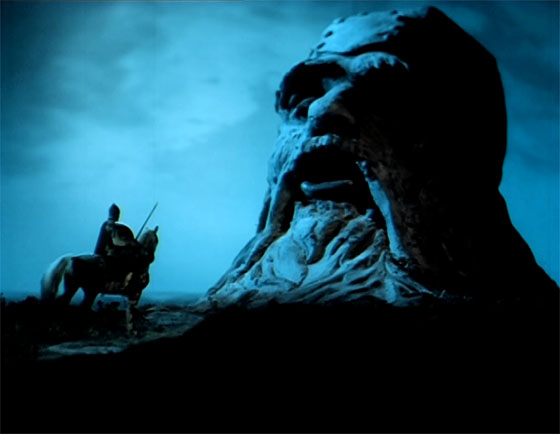
Ruslan bargains with a decapitated giant to find his beloved Ludmila.
That Farlaf actually succeeds in killing Ruslan is just one of the many abrupt and surreal turns in this fairy tale (and it’s not unheard-of; I just read a different Russian fairy tale in which the lead character is suddenly chopped into pieces by his evil brother, only to be magically restored to save the day) – all of which are treated matter-of-factly, replicating the direct and blunt prose of Old World folklore. The film also features a climactic battle in which Ruslan casually chops off heads and impales multiple Pechenegs on his spear at a time. Joining the battle, a motley jester slices an enemy in twain at a single stroke (and cracks a joke about it); all this bloodless but extreme violence reminded me of the final battle with the Turks in Terry Gilliam’s The Adventures of Baron Munchausen (1988). But unlike Gilliam, Ptushko leaves no room for irony. This means that some of the bizarre sights may have you glancing suspiciously at the drink in your hand. After Ruslan has sliced off Chernomor’s beard, he carries the little man in a sack, holding him aloft on the field of battle while the dwarf lets out a wailing noise to knock all enemies flat. This is, indeed, one of the strangest sights I have ever beheld in a motion picture.
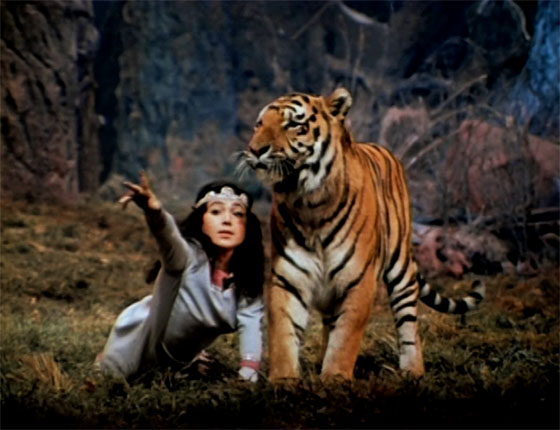
The witch Naina (Natalya Khrennikova), donning a youthful disguise, pretends to be imperiled by a tiger to lure Ruslan off his horse.
But, by God, every frame of this film looks like an illustration from a turn-of-the-century children’s book. Ptushko superimposes his characters onto miniature backdrops and matte paintings, often seamlessly. Stop-motion flowers bloom when Ludmila is brought out of the mountains. Chernomor’s throne room has an upside-down fountain in the ceiling, the spurting water defying gravity, and his long beard is draped down the steps leading to his seat, all attendants kneeling and dutifully combing. Seldom a shot of nature passes (even those on a soundstage) without Ptushko framing a woodland fawn or a swimming frog. Birds flap free of the crevices and orifices of the giant’s severed head when Ruslan awakens him. The first glimpse we get of Ludmila’s subterranean domain is a vast cavern of crystalline formations, but they look like sea anemone, and she seems to be striding through an undersea kingdom – an appropriately disorienting effect for her first moments in the mountain king’s realm. When she further explores the caverns, she encounters stone giants chained to the walls, all of them semi-nude men in tormented poses, an image that brought to my mind, simultaneously, Leni Riefenstahl, Fritz Lang, and Guy Maddin. In one of the film’s singular moments, Ruslan carries Ludmila out of the caves, and the giants, who have given their loyalty to Ludmila, all stand and shake their chains solemnly at the victory. To say they don’t make fantasy films like this anymore is missing the point. No one ever made films like this but Aleksandr Ptushko.
